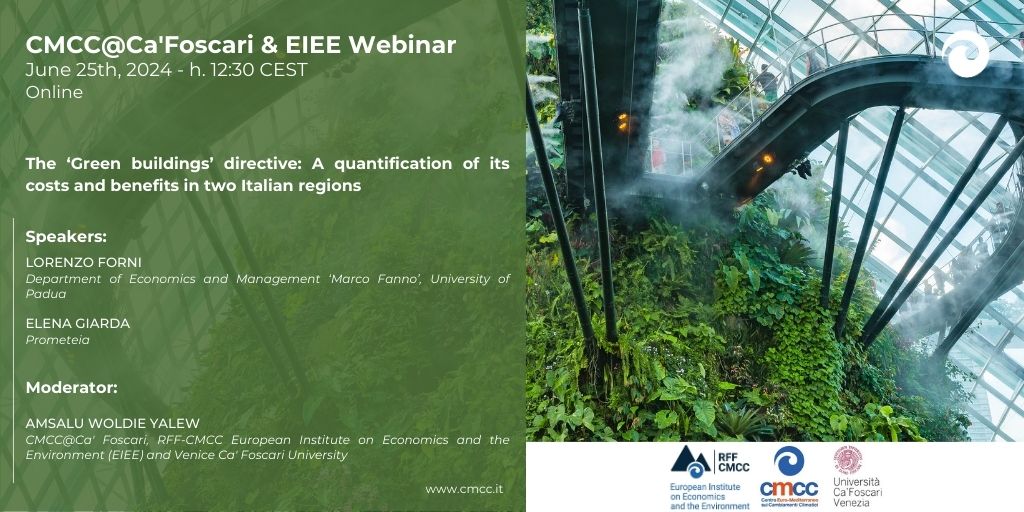CMCC@Ca’Foscari & EIEE webinar
, 12:30 CEST
To join the webinar, register here

Abstract
The aim of this paper is to present a quantitative analysis of the costs and the benefits associated with the implementation of energy efficiency measures in residential buildings, specifically focusing on the recast Energy Performance of Building Directive (EPBD). To this end, we employ novel open-source microdata on Energy Performance Certificates (EPCs) of two Italian regions (Lombardy and Piedmont), which provide information on dwellings’ current energy class and recommendations of the necessary retrofits to reach a higher energy class, as well as CO2 emissions and energy consumption. We estimate a total expenditure of €362.1 billion to take Lombardy’s and Piedmont’s residential stock to at least energy class D, which is about 61% of the two regions’ GDP and about 19% of Italy’s GDP. As for the benefits, households are estimated to save €3.9 billion yearly in Lombardy and €1.6 billion in Piedmont, and CO2-equivalent emissions are estimated to drop by 8 million tons in Lombardy and 3.3 million tons in Piedmont.
Speakers’ short bios
Lorenzo Forni is currently Professor of Economic Policy at the Department of Economic and Business “Marco Fanno” of the University of Padua and Head of Prometeia Associazione, an Italian think tank providing economic analysis and forecasting. He worked from 2010 to 2016 at the International Monetary Fund (IMF) in Washington and previously at the Research Department of the Bank of Italy in Rome. He has published in international journals such as the American Economic Review, the Journal of Public Economics, Oxford Economic Papers, as well as book chapters and numerous working papers. Prof. Forni is the author of “The Magic Money Tree and other economic tales”, selected by the Financial Times among the 2021 best economics books. He received his Master’s and PhD in Economics from Boston University in 2001 and was a visiting scholar at Harvard University in 2005-2006.
Elena Giarda has worked in Prometeia since 2001, where she is now Senior Specialist. Her main areas of expertise are microeconometrics applied to income distribution, poverty and household finance, and tax- benefit microsimulation. Recently her research interests have widened to include buildings’ energy efficiency to evaluate the impact of retrofit costs on households and the price premium of living in a more energy- efficient home. In 1999-2000 she worked as Statistician for the Scottish Government in Edinburgh in the Office of the Chief Economic Adviser. Elena holds a PhD in Statistics from the University of Bologna. Her work has been published in, among others, Journal of Banking and Finance, Journal of International Money and Finance, Review of Income and Wealth, Social Indicators Research and Empirica.
CMCC moderator’s short bio
Amsalu Woldie Yalew is currently a Marie Curie research fellow at Ca’ Foscari University of Venice. He holds a PhD in Economics from the University of Technische Universität Dresden. Previously, he worked as postdoctoral researcher at Potsdam Institute for Climate Impact Research (Germany), and Lecturer of Economics at Debre Berhan University (Ethiopia). His primary research focus is on the energy-economy- environment nexus, and on the multi-sectoral and -regional impacts of climate change in developing countries using computable general equilibrium and partial equilibrium models.
HOW TO PARTICIPATE
, 12:30 CEST
To join the webinar, register here
ORGANIZED BY:
CMCC@Ca’Foscari & EIEE

